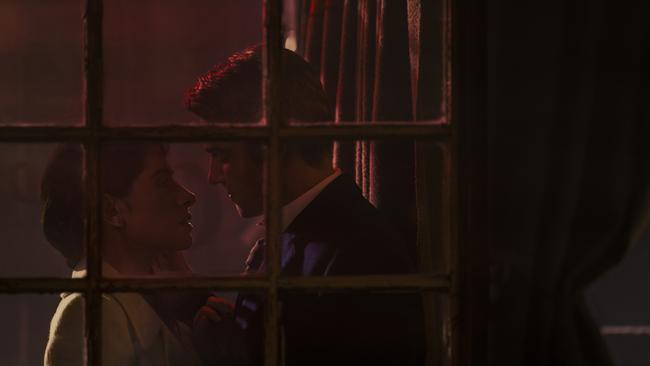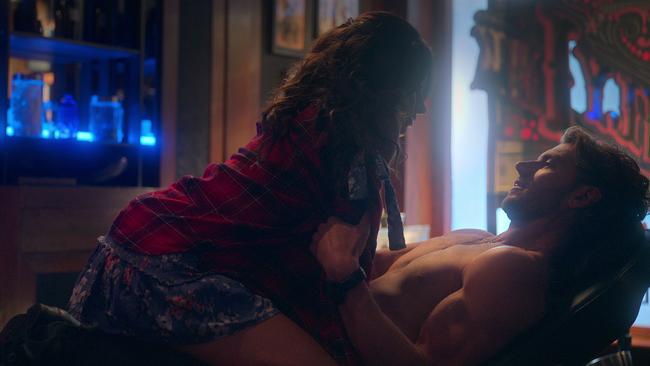Angela Mollard: Why Sex/Life gets marriage question so horribly wrong
Sex/Life, the Netflix drama that has everyone talking, has brought up one blaring question: Can women have it all? Angela Mollard has her say.
Entertainment
Don't miss out on the headlines from Entertainment. Followed categories will be added to My News.
A friend texts when I am on my 57,396th lockdown walk.
“Hey lovely, tell me, is there a column about Sex/Life on your radar?” she asks.
She goes on to explain that all her friends are talking about the new Netflix series and have arrived at a single question: Can women have it all?
Oh dear. This is the singular bad thing about giving opinions for a living – people expect you to have one.
Does she realise I’m going to have to cheat on Clarkson’s Farm (Amazon Prime, very funny) and Mare Of Easttown (Foxtel, Ms Kate Winslet at her glorious best), which I’m already double dating to have a fling with Sex/Life.
Worse, it’s is a terrible name for a TV show. Just as I’m turned off by men with skinny legs, the lazy use of a slash doesn’t do it for me. It’s an unimaginative afterthought not a smartly devised title. Nobody is going to reminisce about a show called Sex/Life as they do Sex And The City.

I digress. Sex/Life is a show about a very attractive woman married to a very attractive man who both live in a very attractive house with two very attractive children.
Three episodes in I can’t actually remember the characters’ names but I can describe their bodies in intimate detail. She, for instance, has an extraordinarily beautiful face and rather large nipples while he has a gorgeous smile and a deliciously muscular, very toned bum.
Of course, thrown into this mix is her very hot ex-boyfriend — again can’t remember his name — but he is Australian and his accent is as broad as his, er, (insert preferred anatomical reference) is long.
I know this because there is a shower scene deliberately inserted (sorry) into episode 3 to keep you watching long after you’ve realised you’ve been duped into viewing soft porn masquerading as drama.
Now there’s nothing wrong with a bit of visual stimulus – particularly in these blancmangey lockdown days – but just like a lover who insists on post-coital conversation, Sex/Life annoyingly asks us to consider whether it’s possible to have a dynamic sexual life with the same person with whom you share a contented home life.
As the sexy new mum — her name is Billie — writes in her (non-password protected) laptop diary: “I’m not sure if this is who I am supposed to be. There was a time in my life when I felt free. I can’t help wondering where did that other girl go?”
Notwithstanding that our new mum is sounding a lot like Carrie Bradshaw, albeit accessorised with babies rather than shoes, I’m going to answer her question, not just because I have sex therapist ambitions, but because it’ll save you having to watch this derisory Debbie Does Dallas … In The Hamptons.
Firstly, I’m not sure it’s helpful for any woman to consider her former lovers while breastfeeding, not least because arousal prompts a surge in oxytocin which could lead to you drowning your baby.

As for whether you can continue to feel erotic about the bloke who shares your bathroom, pretends to be asleep when the kids cry out in the night and is so complacent he regards toenail clipping as optional, well … yes, yes, you can. With provisos.
Essentially, family life requires proximity whereas an explosive intimate life — as opposed to perfectly nice maintenance sex — thrives on newness and distance.
The brilliant Esther Perel, author of Mating In Captivity, calls this the central paradox of love.
“Love enjoys knowing everything about you,” she writes, whereas desire “thrives on the mysterious, the novel, and the unexpected”.
As she points out, as couples settle into the comforts of love, they stop fanning the flames of desire and forget that fire needs air.
This is where Sex/Life gets it horribly wrong. The central couple lack the sophistication to realise that the answer to their dilemma lies in their separateness not their confected attempts at orchestrated togetherness.
As they have sex in a car and in a neighbour’s pool, there’s no awareness that it’s space and intrigue rather than clichéd sexual settings which create an opportunity for desire to flourish.
Billie may be the hottest woman on TV but there’s nothing alluring about her prolonged angst over which man will give her everything she needs.
Neither of them will. Rather, she needs to create a connection with herself and become an independently happy person to create the autonomy which is at the heart of erotic intelligence.
Lingerie, oysters, champagne, candles — they’re all motifs that obscure what is genuinely desirable, namely a confident, warm, emotionally expressive person with the ability to communicate what they want.
And so, to answer my friend, yes, I reckon you can have it all if, unlike Billie, you have the capacity to master the two essential truths about desire: that you have to make space in your togetherness; and that even mind-blowing sex with a new partner — however electric or illicit — will ultimately fade through proximity or projection towards a genuinely fulfilling relationship.
Accepting this – with all the complexity and nuance it offers – is perhaps the sexiest thing of all.
ANGELA LOVES …
PODCAST
Along with its delightful name, Darling Shine is a compellingly raw navigation of grief and the boldness that emerges from it.
ROAST FENNEL
Throw it in with your pumpkin, spuds and sweet potato and enjoy the nutty caramelised taste for lunch the next day with a bit of crumbled fetta.
ACKNOWLEDGMENT
I’m a committed fixer of things but as I support my daughter through a disrupted Year 12 I’m learning that just being alongside another person, listening to how they are, is so much more powerful than trying to solve.



